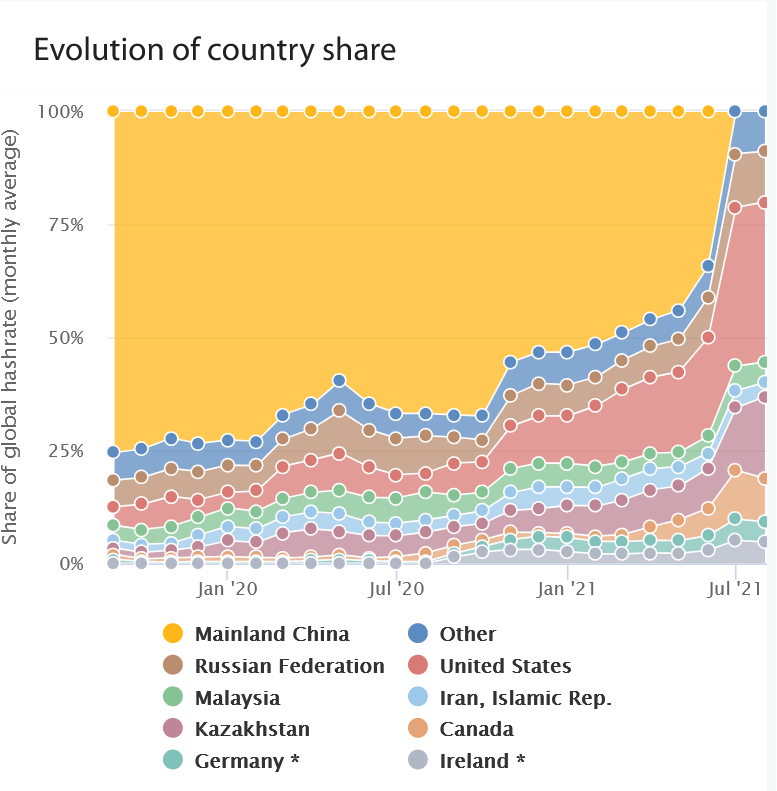Winter’s Here for Bitcoin Miners in Kazakhstan and Iran as Cold Weather Brings Slowdowns

The road to mountain ski resort Chimbulak in Almaty, Kazakhstan. Source: Maxim Petrichuk
Cold weather in some of Bitcoin (BTC) and crypto mining’s hotspots is bringing bad tidings for the industry – with power interruptions experienced in Kazakhstan and the government intervening in Iran.
Per Interfax’s Kazakhstan service, the National Association of Blockchain and Data Centers Industry in Kazakhstan (NABDC) has announced that “several dozen” of its industrial members are “experiencing interruptions” in electricity supplies – rendering a number of data centers “idle for more than a month.”
The NABDC claimed that legal miners in the nation have lost about 300m kWh of electricity since the temperatures began to drop, causing a total “direct loss” of more than USD 9.7m worth of revenue for Kazakhstan’s energy industry.
The body’s President Alan Dordzhiev was quoted as stating that despite a recent government ruling to “urgently” push ahead with the legislative regulation of mining, miners who had complied were still being hit with power outages.
In October, the Minister of Energy and the nation’s President claimed that “above-board” miners would be allowed to “continue their activities without additional restrictions.”
Meanwhile, in Iran, the government has stepped in as temperatures in areas such as Bostan Abad drop down to as low as -10 degrees Celsius, driving energy consumption up – and leading energy providers to order registered crypto mining to stop operating on a temporary basis.
According to the IRIB News Agency, Mostafa Rajabi Mashhadi, the Deputy Managing Director of the Iran Grid Management Company told a radio station that Iran had moved to shut down crypto mining operators to slash fuel consumption at power stations amid decreasing temperatures – and had begun imposing restrictions on the sector beginning last month. He was quoted as stating that the relevant ministry had been disconnecting “licensed” crypto mining centers’ power supplies, as well as switching off street lights in certain parts of the nation as the grid began to show signs of strain.
Rajabi Mashhadi added that forecasts of colder weather in store over the next week meant that citizens needed to use power prudently in the coming months.
Share of global Bitcoin hashrate (monthly average) *
*
Cold weather in some of Bitcoin (BTC) and crypto mining’s hotspots is bringing bad tidings for the industry – with power interruptions experienced in Kazakhstan and the government intervening in Iran.
Per Interfax’s Kazakhstan service, the National Association of Blockchain and Data Centers Industry in Kazakhstan (NABDC) has announced that “several dozen” of its industrial members are “experiencing interruptions” in electricity supplies – rendering a number of data centers “idle for more than a month.”
The NABDC claimed that legal miners in the nation have lost about 300m kWh of electricity since the temperatures began to drop, causing a total “direct loss” of more than USD 9.7m worth of revenue for Kazakhstan’s energy industry.
The body’s President Alan Dordzhiev was quoted as stating that despite a recent government ruling to “urgently” push ahead with the legislative regulation of mining, miners who had complied were still being hit with power outages.
In October, the Minister of Energy and the nation’s President claimed that “above-board” miners would be allowed to “continue their activities without additional restrictions.”
Meanwhile, in Iran, the government has stepped in as temperatures in areas such as Bostan Abad drop down to as low as -10 degrees Celsius, driving energy consumption up – and leading energy providers to order registered crypto mining to stop operating on a temporary basis.
According to the IRIB News Agency, Mostafa Rajabi Mashhadi, the Deputy Managing Director of the Iran Grid Management Company told a radio station that Iran had moved to shut down crypto mining operators to slash fuel consumption at power stations amid decreasing temperatures – and had begun imposing restrictions on the sector beginning last month. He was quoted as stating that the relevant ministry had been disconnecting “licensed” crypto mining centers’ power supplies, as well as switching off street lights in certain parts of the nation as the grid began to show signs of strain.
Rajabi Mashhadi added that forecasts of colder weather in store over the next week meant that citizens needed to use power prudently in the coming months.
Share of global Bitcoin hashrate (monthly average)
 *
* - To our knowledge, there is little evidence of large mining operations in Germany or Ireland that would justify these figures. Their share is likely significantly inflated due to redirected IP addresses via the use of VPN or proxy services. Source: Cambridge Bitcoin Electricity Consumption Index
____
Learn more:
- Russian Provinces Free to Make Crypto Miners Pay Higher Electricity Rates, Says Gov’t
- 20% of Bitcoin Hashrate Is ‘Still in Mainland China,’ Report Claims
- Bitcoin Mining Hash Rate to Double in 2022, Compute North CEO Predicts
- Paraguay: Bitcoin & Crypto Mining Bill Passes Senate, Heading to Lower House
- Dominated by Institutions, Bitcoin Mining is also Possible from Home
- How Bitcoin Mining Might Help Nations With Domestic Energy Production
____
Learn more:
- Russian Provinces Free to Make Crypto Miners Pay Higher Electricity Rates, Says Gov’t
- 20% of Bitcoin Hashrate Is ‘Still in Mainland China,’ Report Claims
- Bitcoin Mining Hash Rate to Double in 2022, Compute North CEO Predicts
- Paraguay: Bitcoin & Crypto Mining Bill Passes Senate, Heading to Lower House
- Dominated by Institutions, Bitcoin Mining is also Possible from Home
- How Bitcoin Mining Might Help Nations With Domestic Energy Production
Crypto miners in Kazakhstan flee over aging electricity infrastructure
Kazakhstan's inability to supply consistent electricity is forcing miners out of the country.
SAMUEL WAN · DECEMBER 28, 2021

Samuel Wan
Kazakhstan’s crypto mining industry was initially boosted by China’s tightening grip on digital asset regulation.
But, some seven months down the line, it’s emerging that Kazakh-based miners are fed-up with electricity shortages. Some miners report nearing bankruptcy due to the national grid’s inability to supply consistent power.
Just as the country was emerging as a significant global crypto mining hub, it seems as though things have gone south as miners begin to leave.
Kazakhstan initially benefited from China crypto ban
China banned financial institutions from dealing with crypto transactions in May this year. In the months following, Chinese authorities have become increasingly hardline on the matter.
In September, a statement from the People’s Bank of China (PBoC) said all crypto activities are now illegal.
As expected, people circumvent rules, for example, turning to DEXes and P2P exchanges. And in some cases continuing to use crypto exchanges via VPNs and foreign registered details.
In response, the PBoC vowed to crack down on all loopholes, including labeling the use of overseas exchanges as “illegal financial activity.” They say this is justified because digital currency “endangers the safety of people’s assets.”
“Overseas virtual currency exchanges that use the internet to offer services to domestic residents is also considered illegal financial activity.”
The upshot to all of this has been a massive slowdown in crypto activity in China, most notably in the drop in mining hashrate coming out of China.
Data from the Cambridge Bitcoin Electricity Consumption Index shows a significant tail off in Bitcoin hashrate from China in May. At the same time, Kazakhstan’s hashrate went from 11.9 Eh/s in May, almost doubling to 21.9 Eh/s in August.
Kazakhstan's inability to supply consistent electricity is forcing miners out of the country.
SAMUEL WAN · DECEMBER 28, 2021

Samuel Wan
Kazakhstan’s crypto mining industry was initially boosted by China’s tightening grip on digital asset regulation.
But, some seven months down the line, it’s emerging that Kazakh-based miners are fed-up with electricity shortages. Some miners report nearing bankruptcy due to the national grid’s inability to supply consistent power.
Just as the country was emerging as a significant global crypto mining hub, it seems as though things have gone south as miners begin to leave.
Kazakhstan initially benefited from China crypto ban
China banned financial institutions from dealing with crypto transactions in May this year. In the months following, Chinese authorities have become increasingly hardline on the matter.
In September, a statement from the People’s Bank of China (PBoC) said all crypto activities are now illegal.
As expected, people circumvent rules, for example, turning to DEXes and P2P exchanges. And in some cases continuing to use crypto exchanges via VPNs and foreign registered details.
In response, the PBoC vowed to crack down on all loopholes, including labeling the use of overseas exchanges as “illegal financial activity.” They say this is justified because digital currency “endangers the safety of people’s assets.”
“Overseas virtual currency exchanges that use the internet to offer services to domestic residents is also considered illegal financial activity.”
The upshot to all of this has been a massive slowdown in crypto activity in China, most notably in the drop in mining hashrate coming out of China.
Data from the Cambridge Bitcoin Electricity Consumption Index shows a significant tail off in Bitcoin hashrate from China in May. At the same time, Kazakhstan’s hashrate went from 11.9 Eh/s in May, almost doubling to 21.9 Eh/s in August.

Source: ccaf.io
Part of the reason for this was the Kazakh government’s encouragement of crypto mining via recognizing the activity in legislation and giving tax breaks to miners.
It also helps that the country enjoys some of the lowest electricity prices globally, coming in at $0.041 per kWh for households.
Soviet-era electricity infrastructure not up to scratch
As quickly as crypto miners set up base in Kazakhstan, the country’s aging Soviet-era electricity grid felt the strain. Residents blame power cuts directly on the presence of miners in the country.
The founder of Xive, a crypto mining firm operating in the region, Didar Bekbauov, said:
“They made mining [a] scapegoat.”
Bekbauov added that Xive closed one of its mining farms in the south of Kazakhstan after its power was cut in November. While the company still operates another facility in the country, he is thinking of closing all operations and moving to the U.S.
Similarly, this month saw Bitmain-backed BitFuFu shit down its Kazakstan operations to set up in the U.S.
Kazakhstan Electricity Grid Operating Company (KEGOC) said it was forced to cut electricity supply due to unscheduled repairs.
Part of the reason for this was the Kazakh government’s encouragement of crypto mining via recognizing the activity in legislation and giving tax breaks to miners.
It also helps that the country enjoys some of the lowest electricity prices globally, coming in at $0.041 per kWh for households.
Soviet-era electricity infrastructure not up to scratch
As quickly as crypto miners set up base in Kazakhstan, the country’s aging Soviet-era electricity grid felt the strain. Residents blame power cuts directly on the presence of miners in the country.
The founder of Xive, a crypto mining firm operating in the region, Didar Bekbauov, said:
“They made mining [a] scapegoat.”
Bekbauov added that Xive closed one of its mining farms in the south of Kazakhstan after its power was cut in November. While the company still operates another facility in the country, he is thinking of closing all operations and moving to the U.S.
Similarly, this month saw Bitmain-backed BitFuFu shit down its Kazakstan operations to set up in the U.S.
Kazakhstan Electricity Grid Operating Company (KEGOC) said it was forced to cut electricity supply due to unscheduled repairs.
No comments:
Post a Comment